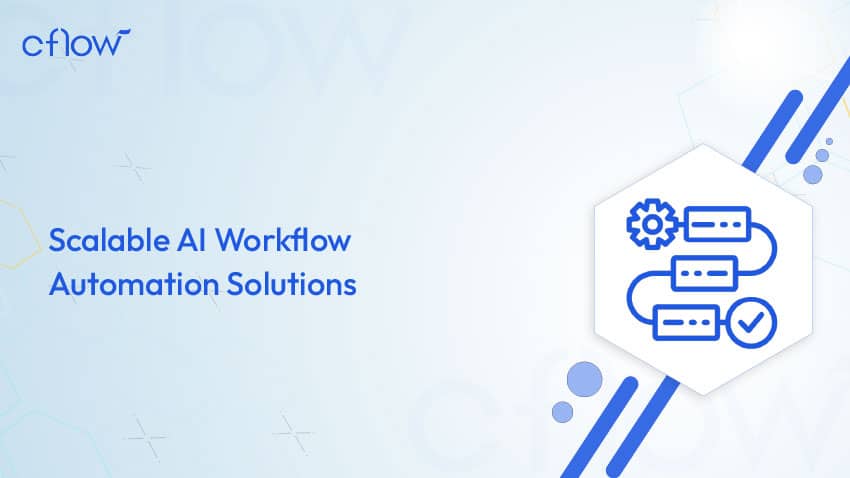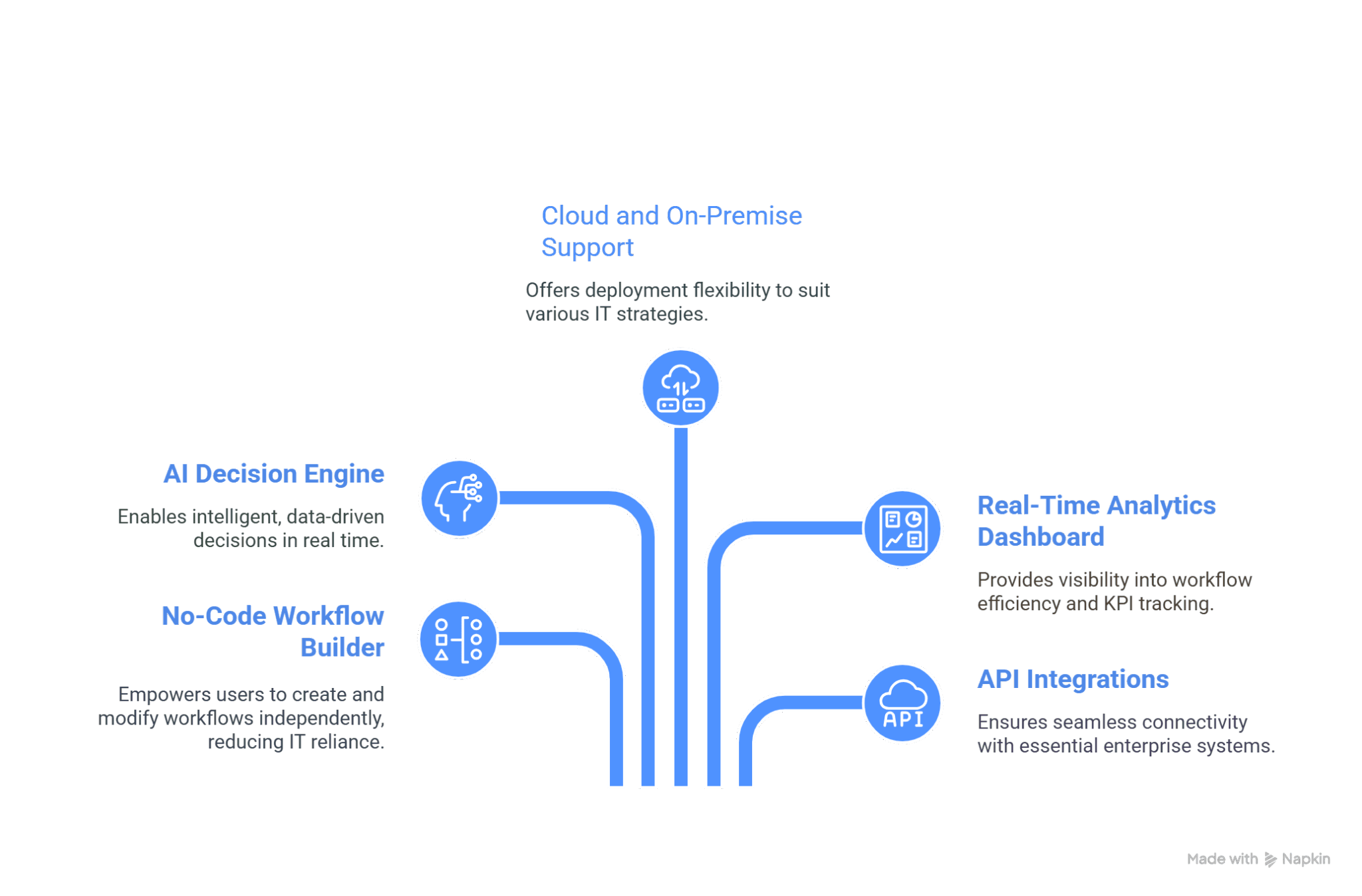Scalable AI Workflow Automation Solutions: The Future of Intelligent Business Operations

Key takeaways
- Scalable AI workflow automation solutions allow businesses to automate processes across teams and departments without compromising performance.
- Enterprises increasingly prioritise automation platforms that support AI decision-making, data-driven insights, and real-time adaptability.
- With scalability at its core, AI workflow automation grows with your business, helping teams reduce cost, boost productivity, and streamline operations.
- Adopting scalable AI-powered workflow tools gives organisations a long-term digital advantage by enhancing agility and efficiency.
Today’s businesses face ever-increasing complexity across operations, customer demands, and regulatory frameworks. To remain competitive, enterprises must adopt solutions that are both intelligent and scalable. AI workflow automation solutions blend artificial intelligence (AI) with workflow automation to simplify and accelerate business processes across the organisation.
78% of organisations now use AI in at least one business function, a major leap from 55% just a year earlier.
As automation evolves from rule-based scripts to AI-powered engines, scalability becomes a critical factor for long-term success.
In this blog, we explore the definition, benefits, challenges, and industry use cases of scalable AI workflow automation. We also examine top features, platform examples, and how to assess readiness for enterprise-wide deployment.
What Are Scalable AI Workflow Automation Solutions?
Scalable AI workflow automation solutions are platforms that combine artificial intelligence with automation capabilities to execute, monitor, and optimise workflows that can grow with an organisation’s needs. These tools enable businesses to automate both routine tasks and complex processes while supporting high volumes of transactions, users, and data.
Scalability ensures that the system can handle increased workloads, expanded teams, and more complex workflows without degradation in performance. AI components add intelligence through predictive analytics, natural language processing (NLP), machine learning (ML), and decision engines.
Example: A multinational financial services company uses an AI-powered platform to process thousands of loan applications daily. As the customer base grows, the automation engine scales effortlessly, adapting to new products, policies, and risk scoring algorithms.
According to Deloitte, 73% of organisations are now piloting or adopting AI to streamline enterprise operations.
The global workflow automation market is projected to hit $23.77 billion in 2025 and reach $37.45 billion by 2030.
Why Scalability Matters in AI Workflow Automation
When businesses adopt automation tools, they often start with a few departments or functions. As the benefits become evident, the demand grows across the organisation. However, not all platforms can handle this expansion. That’s where scalable solutions make a difference.
Key reasons why scalability matters:
- Business Growth: As your business scales, your automation platform should be able to support increased process volumes without reengineering.
- AI Model Adaptability: Scalable AI systems can ingest more data and refine decision-making as operations evolve.
- Cross-Functional Deployment: Enterprises can extend automation across HR, finance, IT, procurement, and compliance functions.
- Cloud-native Architecture: Most scalable solutions are built on the cloud, enabling seamless updates, integrations, and performance.
Especially, Mid-to-large enterprises looking to future-proof operations and support digital transformation initiatives seek platforms with built-in scalability.
Key Benefits of Scalable AI Workflow Automation Solutions
Scalability isn’t just about handling volume; it’s about sustaining performance, adaptability, and growth. Scalable AI workflow automation solutions provide organisations with the infrastructure to maintain efficiency and innovation—even as complexity increases. Below are the standout benefits that make these platforms essential for modern enterprises:
1. End-to-End Process Visibility
Scalable AI platforms offer centralised dashboards to monitor and optimise workflows across departments. This real-time visibility helps identify bottlenecks and measure ROI.
2. Intelligent Decision-Making
Integrated machine learning and data analytics enable AI systems to make context-aware decisions and adapt based on outcomes.
3. Reduced Operational Costs
By automating labour-intensive processes, businesses save on manual effort and reduce error-related rework. Scalable platforms amplify cost savings across growing teams.
4. Enhanced Customer Experiences
AI automation ensures faster response times, consistent communication, and 24/7 service delivery, leading to improved satisfaction.
5. Future-Proof Architecture
With modular architecture and cloud scalability, these platforms adapt to changing business needs without requiring frequent migrations.
Challenges in Scaling AI Workflow Automation
Despite the clear advantages, scaling AI-powered automation introduces some hurdles:
- Data Quality and Silos: AI models rely on clean, connected data. Silos can hinder performance.
- Change Management: Employees may resist widespread automation due to fear of job displacement.
- System Integration: Connecting legacy systems to modern AI engines can be resource-intensive.
- Model Governance: Managing multiple AI models across workflows requires strong governance frameworks.
Applications of AI Workflow Automation Solutions Across Industries
Scalable AI workflow automation solutions are transforming the way industries operate by delivering smarter, faster, and more efficient processes. Whether it’s finance, healthcare, retail, or manufacturing, these solutions adapt to sector-specific needs and workloads, enhancing decision-making, reducing costs, and improving operational resilience.
1. Finance
AI workflow automation in finance goes beyond basic task automation. It integrates with accounting software to streamline invoice processing, reconciliations, and payment workflows. Fraud detection models analyse transaction patterns in real time to flag anomalies, while AI generates predictive risk reports to support compliance and financial planning. This leads to better accuracy, reduced turnaround times, and cost-effective operations.
2. Healthcare
In the healthcare sector, scalable AI platforms enable seamless integration across patient data systems, reducing the manual load on administrative and clinical teams. Patient onboarding is automated with e-forms and insurance verifications, lab test routing is optimised through AI-based scheduling, and prescription management becomes faster and safer with automated approval systems. This ensures HIPAA compliance while improving patient satisfaction.
3. Retail and E-commerce
Retailers benefit from AI-powered forecasting engines that automate restocking and supply chain alerts. Personalised product recommendations and customer segmentation models enhance the shopping experience. Return processing is also simplified through intelligent workflows that manage reverse logistics, refunds, and customer communication—all within a scalable framework.
4. Manufacturing
AI automation in manufacturing optimises equipment performance through real-time monitoring, predictive maintenance, and automated quality checks. Workflows can adapt based on sensor data and production schedules, ensuring minimal downtime. This level of automation improves productivity, reduces human error, and strengthens supply chain resilience. Use AI automation to process invoices, detect fraud, automate reconciliations, and generate real-time risk reports.
Features to Look for in Scalable AI Workflow Automation Tools
Choosing the right scalable AI workflow automation solution hinges on understanding which features drive performance, adaptability, and user adoption. The most effective platforms balance technical robustness with usability, ensuring that businesses can implement intelligent automation without extensive coding or complex integrations.
When selecting a solution, decision-makers should prioritise the following features:
1. No-Code Workflow Builder: Empowers business users to create and modify workflows independently using intuitive drag-and-drop interfaces, reducing reliance on IT and speeding up deployment cycles.
2. AI Decision Engine: Enables automation platforms to make intelligent, data-driven decisions in real time. It incorporates machine learning, predictive analytics, and natural language processing to guide workflows based on context and historical trends. 3. Cloud and On-Premise Support: Offers deployment flexibility to suit a range of organisational IT strategies. Cloud-native solutions enable rapid scaling, while on-premise options support data-sensitive or regulated environments.
3. Cloud and On-Premise Support: Offers deployment flexibility to suit a range of organisational IT strategies. Cloud-native solutions enable rapid scaling, while on-premise options support data-sensitive or regulated environments.
4. Real-Time Analytics Dashboard: Provides visibility into workflow efficiency, error rates, and KPI tracking. These dashboards help managers monitor performance, troubleshoot issues, and identify optimisation opportunities across the organisation.
5. API Integrations: Ensures seamless connectivity with essential enterprise systems like CRM, ERP, HRIS, and business intelligence platforms. This interoperability supports unified data flows and extends automation across the entire tech ecosystem.
How to Assess Readiness for Scalable AI Workflow Automation
Before implementing at scale, businesses must conduct a thorough readiness assessment to ensure smooth adoption and measurable ROI. Jumping into enterprise-wide AI automation without preparation can lead to integration delays, poor user adoption, and limited effectiveness.
Here are the key areas to evaluate:
1. Process Complexity: Map out current workflows to identify repetitive, rules-based, or high-volume tasks that can benefit from automation. Prioritise processes with measurable outputs and dependencies across teams.
2. Data Infrastructure: Examine if your data is centralised, accessible, clean, and compliant with regulations. AI models require structured data from integrated sources to deliver accurate and reliable outcomes.
3. User Readiness: Prepare your workforce through role-based training and clear communication. Highlight how AI automation will enhance productivity, reduce workloads, and support—not replace—them.
4. IT Capabilities: Evaluate existing systems for compatibility with AI workflow platforms. Ensure your infrastructure can handle real-time data processing, integrations, and system scaling.
5. ROI Expectations: Set realistic and measurable expectations around cost savings, time reductions, and error minimisation. Define KPIs before rollout to track post-deployment success.
Future Trends: Where Is AI Workflow Automation Heading?
By 2028, 33% of enterprise applications are expected to include agentic AI, up from less than 1% in 2024. AI workflow automation is evolving rapidly, and the future holds transformative capabilities that go beyond basic process efficiency. Here are five trends reshaping enterprise workflows:
1. Agentic AI Workflows
These next-gen AI agents operate autonomously, managing entire workflows with minimal human intervention. They can make decisions, trigger actions, and optimise processes in real time—ideal for high-complexity scenarios like financial auditing or IT operations.
2. Process Mining and Optimisation
AI tools now analyse historical and real-time workflow data to identify inefficiencies and suggest improvements. This data-driven refinement is essential for continuous improvement and ROI maximisation.
3. Conversational Interfaces
Voice and chat-based interfaces are becoming mainstream for managing workflows. Users can initiate or modify processes by interacting with AI via Slack, Teams, or mobile apps—improving accessibility and ease of use.
4. Hyperautomation at Scale
Businesses are integrating RPA, AI, machine learning, and business analytics into unified automation strategies. This approach enables rapid deployment of intelligent, adaptive workflows across departments.
5. Secure AI Workflow Governance
As AI becomes more embedded in business operations, ensuring model transparency, bias mitigation, and compliance with data laws (like GDPR) will be critical. Future platforms will embed governance as a core feature.
End-to-end workflow automation
Build fully-customizable, no code process workflows in a jiffy.
Why Cflow is the Ideal Platform for Scalable AI Workflow Automation
Cflow stands out as a purpose-built platform designed for scalability, intelligence, and ease of use. It empowers businesses to automate processes across departments with minimal IT dependency while leveraging AI to optimise and adapt workflows dynamically.
How Cflow Supports Enterprise Scalability
- Visual Workflow Builder: Teams can easily scale complex workflows without coding by using Cflow’s intuitive drag-and-drop interface.
- AI-Powered Decision Engine: With built-in AI logic, Cflow helps automate decision-making in workflows by analysing data in real time.
- Cloud-Native Infrastructure: Cflow is built for the cloud, enabling elastic scalability to support growing data volumes, users, and use cases.
- Seamless Integration Capabilities: It connects effortlessly with CRMs, ERPs, and third-party applications to automate processes end-to-end.
- Role-Based Access Control: As teams grow, Cflow maintains security and compliance through robust user governance.
Business Impact
Companies using Cflow have reported improved process speed by up to 60%, reduced manual errors, and faster time-to-deployment of critical workflows. It is especially well-suited for mid-to-large enterprises seeking a scalable and intelligent automation foundation.
Conclusion
As scalable operations become essential in a digital-first world, businesses must rethink how they automate. AI workflow automation not only streamlines processes—it builds the foundation for intelligent, agile growth.
Cflow makes this transformation effortless. With AI-powered design, no-code workflow creation, seamless integrations, and enterprise-grade scalability, it enables teams to work smarter across departments.
Sign up for a free trial of Cflow today and unlock scalable AI automation built for the future of business.
FAQs
1. What makes AI workflow automation scalable?
A platform is scalable when it can handle growing users, data, and workflows without performance issues. Cloud-native architecture, modular components, and API integrations contribute to scalability.
2. Who should use scalable AI workflow automation tools?
They are ideal for mid-to-large enterprises, especially those undergoing digital transformation or facing rapid operational growth across multiple departments.
3. How do scalable AI workflow platforms reduce costs?
By automating repetitive tasks at scale, reducing errors, enhancing process speed, and enabling better resource allocation, leading to long-term cost optimisation.
What should you do next?
Thanks for reading till the end. Here are 3 ways we can help you automate your business:

Do better workflow automation with Cflow
Create workflows with multiple steps, parallel reviewals. auto approvals, public forms, etc. to save time and cost.

Talk to a workflow expert
Get a 30-min. free consultation with our Workflow expert to optimize your daily tasks.

Get smarter with our workflow resources
Explore our workflow automation blogs, ebooks, and other resources to master workflow automation.

